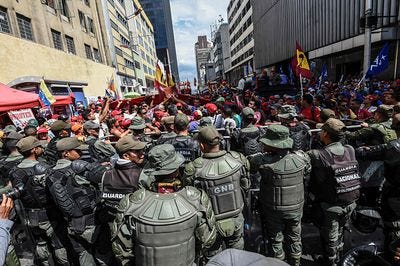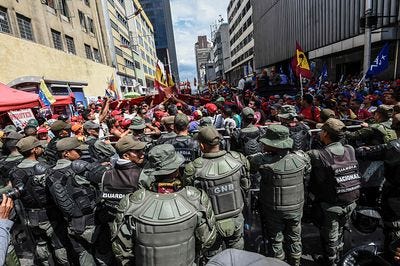Venezuelan Election Fraud Exposed: Is the End of Maduro's Regime Near?
The Venezuelan regime Hugo Chávez founded, commonly known as the Chavista regime, has been a defining chapter in Venezuela's recent history. Emerging from a failed coup attempt in 1992, Chávez's millenarian leadership and promise of a 'Bolivarian Revolution' garnered popular support. A former military officer, Chávez capitalized on public discontent with the established political order, promising to end corruption, reduce poverty, and champion social welfare programs.
Under Chávez's leadership, Venezuela embarked on the foolish experiment of the manifold failed ideas of socialism. The government nationalized key industries, redistributed land, and implemented extensive social programs to improve healthcare, education, and housing for the country's poor. One by one, they failed.
"We are creating a new path, a new order, a whole new history," Chávez declared, emphasizing his vision of a 21st-century socialism.
These foolish promises and policies came at a cost predictable to anyone who knows even a little bit about the history of socialist regimes, especially those in Latin America. The nefarious effects of Chávez's policies were initially obscured by the heavy reliance on oil revenues, but the depths of the economic mismanagement propelled by failed policies could not be hidden forever; they led to soaring inflation, shortages of basic goods, famine and a massive exodus.
Soon, Venezuela's main export seemed to be refugees, strewn across the continent and affecting South American states as distant as Chile. In addition, but also predictable, under Chávez, and later his successor Nicolás Maduro, an uneducated and impetuous bus driver, the regime increasingly resorted to authoritarian measures to maintain control in the face of the economic failures, including stifling dissent, manipulating elections, and centralizing power even more.
July 2024, a critical month for Venezuela, witnessed another contentious election under Maduro's reign. The government-controlled electoral council announced Maduro as the victor over his main opponent, Edmundo Gonzales, by a supposed slim margin of seven percentage points. This announcement, however, was overshadowed by widespread allegations of electoral fraud. Many polls before the election showed an advantage to the opposition of as many as 30 points.
Eyewitness accounts and independent observers identified numerous irregularities. Reports pointed to voter intimidation, with security forces present in voting stations, creating an atmosphere of fear and coercion. Additionally, opposition candidates accused the regime of tampering with the voter registry and manipulating ballot counts. More alarmingly, digital forensics suggested that election infrastructure had been compromised, with pro-government hackers allegedly altering electronic vote tallies to favour Maduro.
International reaction was swift. While pariah states extended their recognition of Maduro's victory, the majority of democratic nations condemned the election as a sham. The European Union, the US, and several Latin American countries denounced the process, emphasizing that it lacked transparency and fairness. This reaction added significant pressure on Maduro's regime, intensifying the sense of impending political upheaval in Venezuela.
As Mercedes De Freitas, founder of Transparencia Venezuela, posed, the fraudulent election is likely to lead Maduro to increase repression to maintain his grip on power. Venezuelans, facing an economic crisis and an eroding democratic process, took to the streets in protest, signalling a potentially volatile period ahead. Maduro has already announced an increased number of imprisonments.
The evidence for fraud in this election is extensive and multifaceted. Firstly, the opposition quickly dismissed the declared results as fraudulent. Maduro's reported victory by seven percentage points raised eyebrows, given the dire economic conditions and widespread dissatisfaction with his regime. Many independent observers and watchdog entities also pointed out significant irregularities in the voting process.
Additionally, Venezuela's Attorney General launched an investigation into an alleged cyber attack on the electoral system, suggesting potential manipulation of the vote tally. Opposition leaders have accused the government of attempting to manipulate electoral data, further casting doubt on the legitimacy of the results.
Moreover, the government-controlled electoral council's role in overseeing the election adds another layer of suspicion. The council has shown bias in the past, undermining its credibility in conducting a fair election. The protests in Caracas and other parts of the country directly respond to these perceived injustices, demonstrating the public's lack of trust in the election's outcome. Maduro has resorted to spinning wild conspiracies that, in his mind, are the result of alliances between US imperialists, narcotraffickers from Colombia and Elon Musk. Yup, Maduro is an ignorant man, and he rarely makes sense.
The broader implications could include increased repression by Maduro's regime and potentially another wave of emigration as Venezuelans seek better opportunities and stability elsewhere.
The Carter Center and other international observers played a pivotal role in assessing the election process. The Carter Center highlighted several irregularities, pointing out that the election conditions did not meet the necessary standards of a fair democratic process. They noted the lack of independent oversight and the significant presence of government-controlled entities "monitoring" the election. Similarly, other international observers, including those from the Organization of American States, criticized the election for its lack of transparency and alleged tampering. Their collective observation stressed a coordinated effort to undermine the electoral integrity, further tarnishing the vote's credibility and drawing widespread condemnation.
Collectively, these indicators point to a highly problematic election marred by potential fraud and manipulation, reinforcing the already fragile state of democracy in Venezuela.
Maduro enjoys the support of a handful of influential regimes. China and Russia offer considerable economic and political backing, viewing Venezuela as a strategic ally. Cuba has long-standing ties with Venezuela, providing intelligence and security support. Nicaragua openly supports Maduro, sharing a common ideological faith and tactics. Meanwhile, Iran, facing its own international isolation, finds a kinship with the dictatorial Venezuelan regime. Shamefully, Lopez Obrador of Mexico is a supporter of the Chavista dictatorship and blames foreign interference for the post-election troubles in that country. Lopez Obrador is on his way out of power.
What is at stake here goes beyond the immediate aftermath of the contested election. For the average Venezuelan, it’s a matter of daily survival in an economy crippled by hyperinflation and scarcity of basic necessities. The international community views this situation not merely as an internal crisis but as a destabilizing factor in an already volatile region. At various times, Chavistas have threatened war with neighbouring Colombia and Guayana.
The pressing question remains: Could this bring Maduro down? The answer is complicated. On the one hand, the mounting evidence of fraud, combined with widespread protests and international condemnation, is galvanizing internal opposition and pushing for a regime change. On the other hand, Maduro has a history of clinging to power by any means necessary, including using the military and security forces to quash dissent.
If the pressure continues to mount domestically and from abroad, it is possible that the Chavista regime may face an insurmountable challenge. Yet, with Maduro's track record, you should be prepared for a potentially prolonged and tumultuous path before any definitive resolution. The response from the military will decide Maduro's fate, and it is not a given that they will back him this time.
If the Chavista regime ends, its fall could signify a monumental shift for Venezuela and the region. First and foremost, it might pave the way for a transition to a more democratic governance structure, allowing voices long suppressed to be heard. You can expect an influx of international aid aimed not only at stabilizing the immediate political climate but also at spearheading economic recovery. The potential for mishandling the massive aid is significant and poses a further risk for a stable country.
An end of the regime brings uncertainty. With power vacuums come risks of internal conflict and competing factions. It's also likely that Venezuelans who fled the country during the economic disaster and political oppression might consider returning, potentially sparking hope and challenges for a society in flux. The country could slip into civil war.
The potential return of millions of exiled Venezuelans might shape Venezuela's future. Having fled during the height of the economic disaster and political oppression, these individuals carry with them hopes for rebuilding their homeland but also represent a considerable challenge for a nation already strained and in transition. Their return could inject much-needed energy and skills into the country, yet it will also require immense resources to reintegrate them successfully.
The international community may play an active role, with democratic nations offering support and pariah states possibly seeking to influence the emerging leadership. This new chapter for Venezuela would indeed be filled with promise, yet it will also bring risks and demand resilience and cautious optimism from its citizens.




